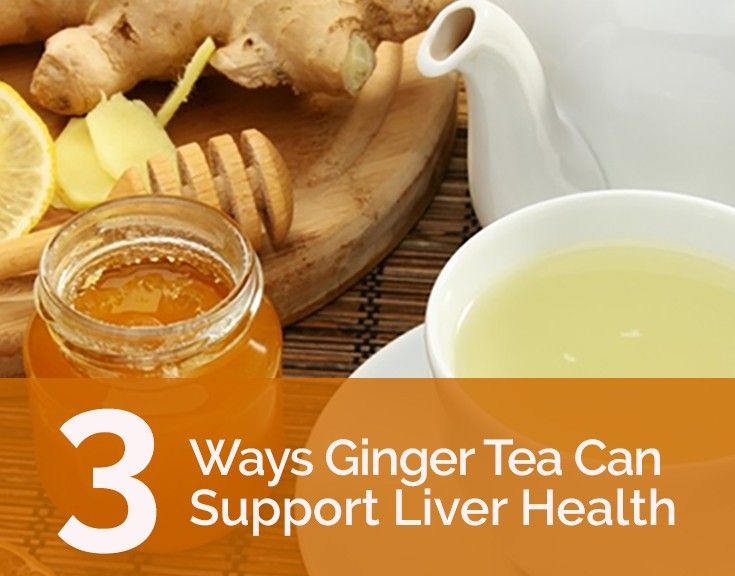
Previous
Turmeric Eases Stress and Reduces Liver Fat

Next
There's a Liver Hormone That Can Stop Your Addiction to Sweets!
Ginger Root Tea for Liver Health
This common, spicy root can reduce fat in the liver and deflect liver damage.
Brewing a cup of ginger root tea is a simple, inexpensive practice that imparts a substantial health benefit to the liver. Of particular value to those with excessive fat in the liver, ginger possesses several therapeutic qualities that can prevent or even reverse fatty liver disease.
About Ginger Root
Easy to locate in the produce section of most supermarkets in the U.S., ginger root is one of the most favored spices in the world. Grown throughout most tropical and subtropical regions, ginger is the underground root of the plant Zingiber officinale. Ginger owes its unique sweet and spicy flavor and aroma to several different essential oils:
- Gingerol
- Shogaol
- Zingerone
Considered to be a valuable herb in several types of traditional medicines, ginger is used for:
- Improving digestion
- Boosting immunity
- Reducing inflammation
- Fighting pathogens (anti-parasitic, anti-fungal, antiviral and anti-bacterial)
- Easing asthma
- Aiding cardiovascular health
- Stopping nausea
- Relieving cold and flu symptoms
In addition, ginger root plays a valuable role in keeping the liver functioning optimally.
About Liver Health
The liver is an extremely underrated organ. We cannot live without our liver. The liver performs hundreds of vital functions, with some of the most important including:
- detoxifying (cleansing) the blood
- producing hormones and other substances needed by the body
- digesting and metabolizing fat, carbohydrates and protein
- storing and releasing energy
Liver disease progressively damages liver cells, which impedes all of these functions. Even if a person does not have liver disease, exposure to harmful toxins or excessive fat accumulation can injure liver cells. A healthy liver can typically regenerate new cells to replace damaged ones. However, damage from continual toxin or fat exposure can outpace the liver’s ability to regenerate – and liver scarring (fibrosis) can result.
Ginger Supports Liver Health
A daily cup of ginger root tea offers liver health benefits. Ginger’s spicy taste is indicative of its thermogenic properties, which improve blood circulation and the delivery of oxygen, minerals and vitamins to all cells in the body. In addition, ginger root naturally has a high antioxidant content, which reduces cellular damage.
- Liver Fibrosis – According to a study published in the June 2011 issue of the journal Nutrition and Metabolism, ginger may protect against liver fibrosis. Researchers tested several extracts of ginger and found that all extracts increased levels of antioxidant enzymes used by the liver, including glutathione and superoxide dismutase. Thus, ginger has the capability to protect liver cells against damage by free radicals.
- Fatty Liver – According to a study published in the January 2011 edition of the World Journal of Gastroenterology, ginger may protect against non-alcoholic fatty liver disease (NAFLD). A condition that affects an estimated 33 percent of American adults, NAFLD is associated with obesity and insulin resistance. The researchers believe that ginger may help prevent or treat this liver condition by reducing oxidative stress on the liver, decreasing insulin resistance and inhibiting inflammation – all contributing factors to NAFLD.
- Fatty Liver – According to a study published in a March 2016 edition of the Journal of Agricultural and Food Chemistry, ginger essential oils can reduce levels of fat accumulation in the liver. In an animal model, researchers found that administering ginger essential oils significantly reduced levels of fat accumulation in the liver. The researchers suggest that ginger essential oils are an effective dietary supplement to ameliorate NAFLD.
More About Ginger Root Tea
Brewing ginger root tea can be done in 3 simple steps:
- Peel and slice three to six slices of fresh ginger.
- Simmer ginger slices in two cups of water for approximately five to ten minutes.
- Strain and add honey to taste (if desired).
Although ginger root is considered extremely safe, it is not for everyone. Certain sensitive individuals may experience side effects such as heartburn, diarrhea and mouth irritation. In addition, those with a bleeding disorder or anyone taking blood thinners, diabetes medications or high blood pressure medications are advised to discuss daily ginger tea consumption with their physician.
Besides reducing inflammation in the body, stimulating digestion, aiding blood flow and boosting immunity, ginger protects the liver from scarring and fat accumulation. Thus, for a relatively low cost and minimal effort, incorporating ginger root tea into your routine can help improve overall health and promote optimal liver function.
http://humannhealth.com/ginger-tea-dissolves-kidney-stones-cleanses-liver-obliterates-cancer-cells/1946/, Ginger tea: Dissolves Kidney Stones, Cleanses Liver & Obliterates Cancer Cells, Retrieved March 6, 2016, Human N Health, 2016.
http://www.livestrong.com/article/481099-what-are-the-health-benefits-of-ginger-for-the-liver/, What Are the Health Benefits of Ginger for the Liver?, Tracey Roizman, DC, Retrieved March 6, 2016, Demand Media, Inc., 2016.
http://www.livestrong.com/article/512339-ginger-fatty-liver-disease/, Ginger & Fatty Liver Disease, Lucy Burns, Retrieved March 6, 2016, Demand Media, Inc., 2016.
http://www.ncbi.nlm.nih.gov/pubmed/26900108, Ginger Essential Oil Ameliorates Hepatic Injury and Lipid Accumulation in High Fat Diet-Induced Nonalcoholic Fatty Liver Disease, Lai YS, et al, Retrieved March 6, 2016, Journal of Agricultural and Food Chemistry, March 2016.






